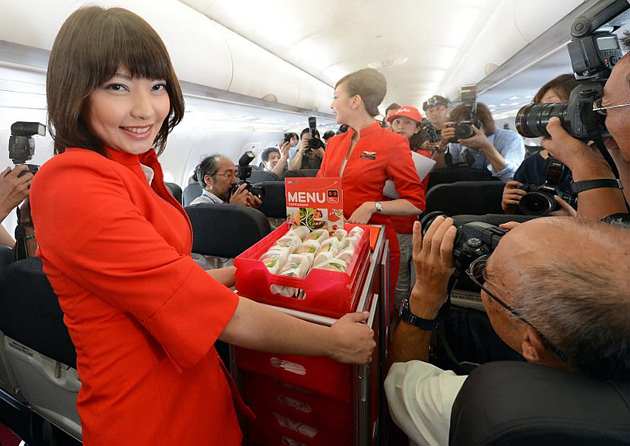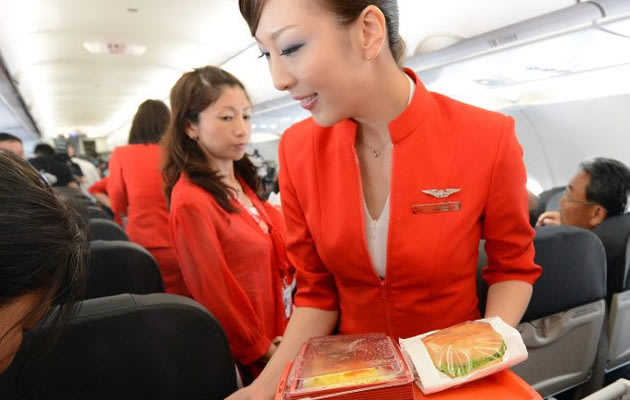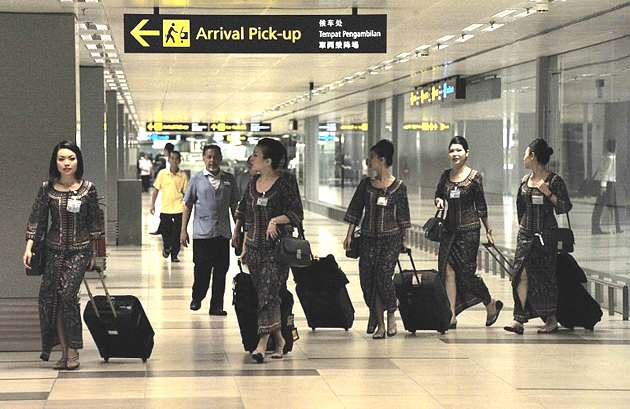Life of a Air Stewardess & Air Steward // The Harsh Reality
read this article on Yahoo! Singapore and I found it really interesting, so I decided to share with it on my blog(: It is really an eye opener as you get an inside scoop into the life of an air stewardess/air steward.
Because you know, like me, you’ll probably be thinking that the life of these air stewardess and air stewards is pretty cool and glamorous right?
That because we always tend to view them that way (especially the SIA girls in their lovely kebaya) as they seem to have it all – jet-setting all around the world, great prospects, luxurious lifestyle (due to their generous travel allowances) and did I mention most of them are gorgeous?
Moreover, the criteria to become an SIA girl or an air stewardess / air steward is REALLY really difficult as the bar is set pretty high. This further adds to the perception of air stewardess (especially) being the perfect glamourous job right?
Well, that’s where we’re thinking wrong
If you’re thinking of a career as an air stewardess/air steward, you might want to learn more about the behind the scenes and real stories from air stewards/stewardess about this job so that you can prepare yourself better for it. And the reality of this job is far from what you expect.
To find out more about why I said so, I suggest you read this following (super long, BUT interesting) 3 part article written by Elizabeth Soh from Yahoo Singapore. For easier reading, I’ve compiled all 3 articles into this blog post(:
What’s life really like behind the bright smiles, perfect uniforms and five-star hotel stays of jet-setting flight attendants? In a three-part series on the inflight service industry, Yahoo! Singapore finds out that it’s not all that it’s cracked up to be. (For the purposes of this series, only first names have been used as most flight crew are bound by confidentiality agreements)Part I:Many SQ girls, tempted by easy money and their jet-setting lifestyle, fall into the trap of living beyond their means (AFP file photo).A glamorous life in the skies, jet-setting to exotic cities like Tokyo, London and Paris – and being paid (very well) to do it.To many, the perfectly coiffed and immaculate airline crew have it all – striding confidently and elegantly through international airports and being able to picnic at the Eiffel Tower one week and then be on safari in South Africa the next, all the while staying in five-star luxury hotels.But ask the flight stewards and stewardesses themselves and you get a very different picture.“Supermodels in uniform? Most of the time, we feel like waitresses – just further above ground,” scoffs a senior stewardess Vanessa K, 34, who flies with a well-known Hong Kong carrier.She isn’t the only flight crew to feel this way. All 15 air stewards and stewardesses from various airlines Yahoo! Singapore spoke to expressed similar sentiments: that when the novelty of flying wears thin and the trips get longer, the shiny veneer of glamour and excitement disappears quickly to be replaced with loneliness and homesickness.Add to that the recent allowance and hiring cutbacks facing the airline industry due to stiff competition from budget carriers and an increasing number of flight crew are ditching their jobs to find stability back home and on land.Honeymoon first yearThe first two years of a flight attendant’s career are apparently the happiest years.“When you first join, it really feels like the best job in the world – everyone envies you,” said Singapore Airlines girl Marie T, 26, who has been a stewardess for nearly five years.“Firstly, the pay is really good. For SQ, we can easily hit S$4,500 a month with allowances. Secondly, we get to travel the world without paying a single cent. All your colleagues are outgoing and good looking – it feels like you’re perpetually on holiday.”For Marie, who only had ‘O’ level qualifications, a salary of S$4,500 was far more than what her peers were earning. She had previously worked part-time jobs doing sales and administrative work for less than half of her current pay.“My spending power increased so fast, I could treat my parents and friends to good meals and talk about my trips to places like Rome, New York, Tokyo. If I was not an SQ girl, I definitely would not have the money to go to these places. I was really on a high for the first two years,” said Marie, who, before becoming a stewardess, had only travelled as far as Hong Kong.Within two months, she had bought her first S$3,000 branded bag, expensive gifts for her parents, and splurged on hundreds of dollars’ of skincare and makeup for herself.“The lure is really easy money. You don’t have to work 9-5, and when you’re on your days off, you’re really off – you don’t bring your work home. On top of that, the pay is good, and if you’re single, it’s super fun to hang out with pretty girls and travel all the time,” said Emirates steward Daniel, 29, who left his S$2,600 job as an accountant to take to the skies.“You meet all these new and enthusiastic people on every flight and you party with them, hang out footloose and fancy free in a foreign country. It’s an exciting life that a normal desk-bound paper pusher would never get to experience.”It’s a hard life: Journalists take pictures of Air Asia Japan’s crew providing meals. (AFP file photo)Travel fatigueTwo years in is when most flight crew start finding their job to be more a burden than a joy. Those who are married or in relationships start feeling the strain of being away from loved ones, while others find it hard to maintain friendships or find a potential spouse with their irregular work schedules.“In the beginning, I’d immediately leave the hotel room to explore the country I was in but after two years, I just wanted to stay in my room and Skype with my fiance, or order room service and watch a DVD. Traveling got more and more tiring each time, and I feel like my face has aged six, seven years in just two years because of all that flying,” said ex-stewardess Jasmine Yeo, 34, who left her Hong Kong-based airline employer to get married and start a family three years ago.“It is the worst when we are away during festive seasons like Christmas and Chinese New Year. I’ve seen many stewardesses crying in their hotel rooms because they can’t make it back for reunion dinner or a good friends’ wedding.Travelling is fun, but after a while I keep wishing I had my loved ones with me enjoying all these beautiful places. The feeling is really empty.”“In the beginning, it’s fun, and you tell yourself you don’t mind not being there for New Year. But three years in, when you’re alone in your hotel room with only your lap top and you see your family on your webcam enjoying steamboat and going visiting together, it can get really hard. It doesn’t seem worth it to miss all these moments,” said Daniel.Alcohol-fuelled parties – once an attraction to newly ‘graduated’ flight crew – become tiresome for those who are married or attached and want to stay faithful. Most end up staying in their rooms alone to recuperate from their long hours on the plane.Broken relationships, affairsThis loneliness is what leads many flight crew to resort to short-term flings or affairs when they are at work. All 15 this reporter spoke to said that they had been propositioned by fellow stewards or stewardesses before and that sleeping around was fairly common, especially among the younger crew.“In general crew members are very friendly and flirty with each other – we like to keep things light-hearted when we are working because the pressure of handling a plane full of uncomfortable and demanding passengers can get to us,” said Qantas steward Jonathan, 35.“If we’ve got chemistry working together on the flight, we usually hang out after we touchdown – if both parties are single and willing, sometimes one thing leads to another. No strings attached, of course. It’s an unspoken rule.”Not all obey this rule, however, and Cathay Pacific stewardess Y.L Tung, 28, told Yahoo! that she has seen cases where flings or affairs turn ugly.“The most common scenario is when an amorous steward on board who approaches all the hostesses – both single and attached. Some of them don’t get the message and overstep their boundaries. One time, I saw a steward being thrown out of a hotel room by an angry colleague who was not interested. He was only wearing his boxers. We had a good laugh,” she said in Mandarin.But, she adds a little sadly, “we are all quite lonely for home and most of us have a tough time maintaining relationships”.Some common pick-up methods used by male flight crew include invitations to “watch a show in my room together” or a lot of “accidental” body contact in the crowded flight cabins.Lower pay, poor job prospectsEarlier this month, it was reported that Singapore Airlines would be adjusting its flight allowances according to new exchange rates – cutting the allowances received for working on flights to Europe and America by as much as 20 per cent.The change would severely impact the salaries of many of their flight crew, who draw low basic salaries of about $2,000 and rely on their travel allowances to support their lifestyles.For flight crew with other work experience and higher education, the immediate response has been to quickly start looking elsewhere for employment – a trend that has resulted in a steadily growing turnover rate among airline crew all over the world.“It’s quite simple – if I leave now, I can start over without feeling the pinch as much. If I stay another three-four years and then leave, starting from scratch with no relevant experience will put me in a very lousy position. I am just cutting my losses,” said SIA steward Lionel, 25, who joined after he graduated last August but is thinking of quitting once his first six months are up.Then there are those without the option of a equally well-paid career on the ground.Credits: Elizabeth Soh, Yahoo Singapore HEREPart IIServing demanding customers in a restaurant can be nasty business. But up in the air, it can be many times worse.Cranky passengers and crying children cramped into limited space for hours miles in the air make for one of the most pressurizing (pun intended) working environments in any service industry.“There’s a 50/50 chance of a flight being smooth or a complete nightmare. The stress can be incredibly high – and there’s no escape. You’re in a plane. You can’t leave and take a smoke or walk to the back of a restaurant for some fresh air. You take a minute to calm yourself in the tiny crew galley and then it’s back to work to face those annoyed, uncomfortable and angry passengers,” summed up Qantas steward Rick, 36.In his almost decade long career as a flight steward, Rick has done everything from warming up milk in an ice bucket while balancing a screaming baby on his hip, to chasing couples hoping to join the mile-high club out of plane toilets.“It’s a skill like no other. I tell my friends, I can handle anybody and anything now. And with a smile,” laughed the Singapore-born steward who is now an Australian citizen.Unlike Rick, however, most of the other 14 flight crew Yahoo! spoke to said they often struggled with keeping their smile – and cool – when confronted with nightmare passengers and filthy, clogged toilets which stink up the entire plane.Treated like slavesThe poor treatment starts right from the get go – with fussy passengers demanding to have their seats switched or shoving hand-carry luggage at flight crew expecting to be helped with stowing it away.“If I see a young lady or elderly person struggling with pushing their luggage into the overhead compartments, of course I will help. But so many times rude passengers just dump their luggage on my arms and then sit down after telling me to ‘help me keep this’. I tell them politely they are supposed to do it themselves, but still help with it anyway,” said SQ stewardess Karen, 31, who added that many even roll their luggage over the feet of cabin crew in their haste to get to their seats.She has also had passengers asking for their seats to be switched because they don’t like the person they’ve been placed next to, feel that their seats are uncomfortable, or, incredibly, want to have empty seats next to them so they can take a two or three seat nap across the row.“If it’s a child or someone who is genuinely uncomfortable and the flight is not full, we always oblige,” said Karen.“Sometimes we can’t because there aren’t enough seats, and they are being unreasonable. Some are just trying their luck, but we’ve had people who shouted until their saliva hits our faces and then threaten to complain to management.”In these cases, Karen simply escalates the matter to the lead flight crew and continues about her business.The rudeness usually continues on through the flight, with passengers simply reaching out to tug on the flight crew’s uniforms as they move up and down the aisle. Certain Asian passengers, for example, are commonly known for being blatantly disrespectful to stewardesses.“These men just yank at my skirt when I am distributing snacks or drinks. Once they pulled so hard at my colleague’s skirt she nearly fell down, and they laughed,” said Korean Air stewardess Jenny, 27.Her colleague was so humiliated that she started to cry once she reached the back of the plane.Jenny said that she has also been pinched on her arm by persistent passengers and some even try to walk up to the meal trolley to demand a tray because they cannot wait their turn, and others who treat her uniform like a napkin, wiping their dirty hands on her skirt as she walks past.Meal-times are another trial for flight crew, as they are inundated with demands for extra meals, different food and drinks while cleaning up the mess made by clumsier passengers or children.“The most common issue we deal with are people who do not inform us beforehand that they need a vegetarian meal, and then get upset when we don’t have enough to go around. We only pack a limited number of vegetarian meals. Some of these passengers aren’t even vegetarians – I’ve seen many who finish the regular meal and demand a second vegetarian one,” said Emirates stewardess Shikin, 26.Those who ask for second rounds and it’s likely that a crew member has to give up his or her meal for you as catering only allows for a limited number of meals to be brought on board to avoid wastage and save space.)“So many times we’ve given up eating ourselves so a passenger can have an extra portion – but I have only been thanked once,” said Shikin ruefully.Drunken, rowdy passengersAll flight crew are unanimous when it comes to their passenger from hell – The Rowdy Drunk. Usually male, middle-aged and travelling alone, they are the most difficult to handle and agitate the entire plane of passengers with their antics.“I can tahan (tolerate) the sleepy drunks. At most, they vomit and then fall asleep. But the ones who start disturbing other passengers and crew are the worse,” said SQ steward Frank, 32.Flight crew are given instructions on how to prevent the passenger from getting drunk in the first place: once they notice a passenger has been drinking, they mix weaker drinks or try to offer them other beverages instead. However, this method does not work on most, who are already determined to drink as much as possible.“They get angry and ask why I’m adding less alcohol and more mixer. Then they demand to have three miniatures (small alcohol bottles). It’s really tough to stay polite and helpful but firm,” said Frank.Things get ugly quickly – many drunk passengers start to slur and use rude languages to harass flight crew who deny them more alcohol, or vomit on themselves and their neighbours, creating a scene and disturbing their fellow passengers.Frank said that in worst case scenarios, if the passenger starts getting violent or verbally abusive, the crew leads him or her away to the back of the plane, where they try to isolate and sober up the person up. If they can’t control him, plastic flexi-cuffs are used to attach the passenger to male crew members, who stay with him for the rest of the journey until the plane touches down.“I have had to accompany one drunk passenger who puked on himself, puked on me and all over the seat. It was the worst flight ever. I felt like throwing up too and let’s just say he threw up 2 hours into a 7-hour journey,” said Frank, his expression full of disgust.Ex-steward Donald Yeo, 46, recounts a horror situation when a drunk South Asian passenger started arguing with passengers and crew and using derogatory terms on the stewardesses. He refused help to go to the toilet, and on his way down the aisle, fell flat on his face, losing two teeth.“Wow, that moment was just great. Of course, we couldn’t show it on our faces, but it felt really good. I didn’t even mind cleaning up his vomit after that,” said Yeo.Filthy toiletsSecond on their list of pet peeves are filthy toilets, especially on long haul flights. All it takes, they say, is one inconsiderate passenger for the mess to get out of control.“It can get absolutely gross, worse than a public toilet,” said Karen, describing occasions when she found faeces on the floor or on top of the toilet seat, dirty baby diapers overflowing from the trash bin, and a wash basin clogged with spat-up food.“We do our best to clean it up, but often we have to shut the toilet, which is a lose-lose situation because the other toilets get overused and equally dirty.”The other flight crew have had their share of stomach-curdling moments. One reached into the front pouch of a seat to get a vomit bag for an ill passenger, only to pull out a hand coated in phlegm – the passenger had earlier spat into the bag. Another was given a used blanket by a First Class Passenger only to find a mess of baby faeces and urine when it was opened.“Glamour? What glamour? There is no glamour in cleaning toilets,” said Rick with a laugh.“When you think about what we have to put up with on flights, you won’t think that our salaries are that fantastic. We’re often so exhausted after long flights we sleep away our recreational time, and by the time we’re rested, it’s time to meet our next plane load of passengers.”Credits: Elizabeth Soh, Yahoo Singapore HEREPart III:Many SQ girls, tempted by easy money and their jet-setting lifestyle, fall into the trap of living beyond their means (AFP file photo)SQ stewardess Vanessa (not her real name) is only 29 but she has over ten credit cards and is more than $30,000 in debt. Despite her growing credit card bills, she continues to live in style, driving a European sports car and owning a wardrobe full of expensive branded bags and clothing, most with their price tags still on.Her extravagant behaviour is far from uncommon in the industry she works in – in fact, she said, most of her colleagues lead the same lifestyle. Young, beautiful, well-paid and jet-setting, their motto is to “live in the now” – and spend far more than they earn.In Vanessa’s case, however, she might have bitten off more than she can chew: she has accumulated so much debt that she currently only pays the interest on her credit cards to keep the banks at bay.“I know I’m in trouble, but I don’t know how to get out of it. Maybe I’ll sell some of my bags to pay it off. But I can’t sell my car, I’ll make a big loss,” said the petite, pixie-faced young woman during a recent three-hour interview with Yahoo! Singapore.Vanessa started working as a flight attendant after graduating from a private university here about five years ago and was instantly swept up by the free-spending behaviour of her fellow flight attendants.“I started off buying one branded bag per long haul trip, which works out to maybe two or three bags or S$4,000 a month for luxury brands like Miu Miu and Prada. Within half a year, I “graduated” to even more high-end brands like Chanel and Hermes and was spending about $7,000 a month on my bags,” said Vanessa, who cringed when she said the amounts out loud.While she declined to comment on how much she earned a month, she said that it was “at least” $6,000 on average.Out of this sum, $2,500 a month goes to paying for her car, which she admitted she hardly uses because she is seldom in town, and everything else goes to either shopping or paying part of her debt.“Of course, I feel very stupid. I drive an expensive car, carry an expensive bag to meet my friends, but I always leave before meal times to go home and eat plain bread because I can’t afford to eat at a restaurant like them. I have no savings at all. In fact, my balance has been negative since I started to work,” said Vanessa.However, instead of turning her life around and adopting a lifestyle change to clear her debts, Vanessa said she has no intention nor determination to give up her so-called “high life”.“My colleagues and I have an inside joke. We all owe quite a lot of money, and we always say – all we have to do is a “Jamie Cuaca” and we’ll be secure for the rest of our lives,” said Vanessa.The ex-Mrs Jamie Cuaca, now Jamie Chua, is a former SQ girl-turned-socialite who married Indonesian tycoon Nurdian Cuaca after the pair met when the latter flew in Business Class. Their acrimonious divorce saw demands from Chua for maintenance of $500,000 a month, and she is famous for owning more ultra-expensive Hermes Birkin bags than celebrity Victoria Beckham.“I feel that the only way I can stop my crazy spending is to quit my job so that I don’t feel the pressure of keeping up appearance(s). But the money is too good – and I’ve been doing this for five years, I can’t imagine working in any other job,” said Vanessa.Poor healthHer bank account isn’t the only thing that has suffered from her choice of career. According to Vanessa and her colleague, who wanted to be known only as Min, female flight crew suffer from a range of occupational hazards which include hair loss, headaches, and tired legs with cracked heels.“Those of us with long hair need to keep it tightly pinned and in a bun that we secure with lots of hairspray. The hairstyle is very heavy and a lot of us get bad headaches as a result. The hairspray also damages our roots and hair quality… leading to hair loss,” said Vanessa.Their skin condition also deteriorates due to the extremely dry inflight cabin air, while cracked heels and varicose veins come from standing on their feet for hours on end with hardly any rest.“It’s a job that you can only do when you’re young, because unless you take very good care of yourself, your body will not be able to handle the pressure of flying non-stop,” said Min, 28, who cut her hair to chin length after pinning up her long locks gave her bouts of migraine every month.Severe dry-eye syndrome, fatigue and weight-gain are other common problems that flight crew face because of harsh cabin conditions and irregular meal and sleeping times.“There is a permanent feeling of confusion. I always wake up not very sure about where I am, and I don’t think it’s good for my mental health either to always feel a bit lost,” said Min.Weight gain is also a permanent pre-occupation for flight crew, who are under pressure to stay svelte and slim in their uniforms. SQ’s iconic kebayas, in particular, are unforgiving on less-than-perfect hourglass figures.“A lot of girls take weight-loss supplements bought overseas but banned here to lose weight. It’s not like we have time to go to the gym regularly. Although nobody will say you are getting fat or your uniform is bulging, we are all very aware of the need to look good. It’s our livelihood,” said Min.Difficulty settling downBoth Vanessa and Min said they have not been in a stable relationship since they started working because their boyfriends could not accept their long absences or trust them when they were overseas. They also said their ex-boyfriends felt extra pressure after seeing how high-maintenance they had become, putting a serious strain on their relationships.“In the end, we date other stewards because it’s convenient, but because we know all about how easy it is for flight crew to cheat, it becomes our turn to get suspicious,” said Vanessa.While many flight crew live on the same extravagant terms as Vanessa and Min, there are others on the opposite end of the spending scale – scrimping and saving for something bigger, especially education.“I feel very tempted to splurge when I’m on long-haul trips to Europe, but I control myself by leaving my credit cards at home and only carry small amounts of cash with me,” said steward James, 27, who joined Qantas to pay off his university loans.After two years, James has already stowed away enough to pay off his loans, and more. He intends to use the excess to buy an engagement ring for his long-time girlfriend, with whom he has already applied for a flat.“It’s very easy to lose focus of what you want with all the hard partying and peer pressure from colleagues but I stuck to my goal. For me, flying is not a career. It’s given me a chance to explore the world for two years, earn more than decent money to pay off my loans and not be a burden to my parents,” he said.“I am starting off my ‘real life’ a bit later than my other friends whose parents paid for their university education, but it is good to be debt-free.”“I’m worried about the cuts, of course. It affected morale among us quite badly,” said Marie, who said she had considered leaving Singapore Airlines but felt that she would not be able to make as much money elsewhere.“I only have ‘O’ levels. If I quit and work somewhere else, my pay will be less than half. I have monthly installments to pay on my credit cards. I cannot afford to quit,” she said bluntly.“Even my parents don’t want me to quit. However, if I could turn back time, I would have just continued studying and getting a degree. My thinking was too short-term and now I am stuck.”Credits: Elizabeth Soh, Yahoo Singapore HERE–
After reading this article, I can say that I will never look at air stewards or air stewardess the same way again. Coming from a hospitality background as well, I understand Part II extremely well, and the that’s why I’m not working in this industry after graduating. Yeah… I will never be able to take it, I will just break down and cry if a customer is mean or complains about me or all the possible negative scenarios that could affect me.
That is why these air stewardess / air stewards do have my respect – especially to those who have persevered over the 2 years ‘honeymoon’ period as mentioned







No comments:
Post a Comment